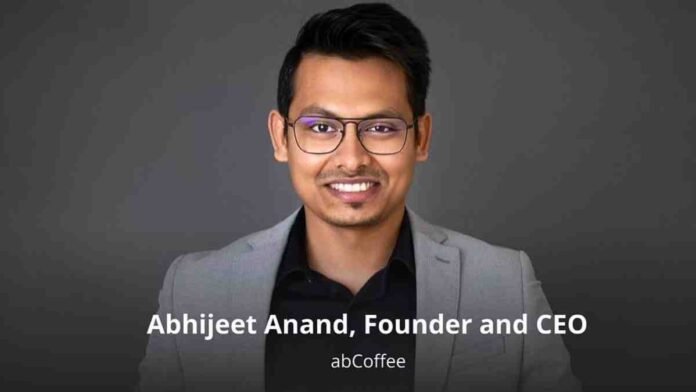Abhijeet Anand, an entrepreneur from IIT Dhanbad, is creating abCoffee, a network of tech-enabled locations delivering “affordable” specialty coffee at affordable prices. The company’s strategy is centered on the QSR model, which helps limit waste and keep pricing low. It generates 1.8 crore rupees in annualized income.
A cup of cappuccino or latte will cost you anywhere between Rs 200 and Rs 350, and perhaps much more. Therefore, it is often believed that specialty coffee in India is a costly endeavor.
Abhijeet Anand, an entrepreneur from IIT Dhanbad, hopes to remedy this with abCoffee, a network of tech-enabled locations delivering “affordable”, grab-and-go specialty coffee.
The origin of the coffee beans in speciality grade coffees can be tracked to a specific farm or plantation. Green coffee beans are purportedly hand-selected, consistent, and flawless. These coffees have a cup score of at least 80 points (out of 100), which is determined by qualified graders and experts using standards established by the Specialty Coffee Association, a global organization that keeps track of the production and quality standards for specialty coffees.
According to Anand, the founder and CEO of Mumbai-based abCoffee, which was established in June of last year, “abCoffee is solving the issue of the price point of specialty coffee through innovative tech-enabled coffee outlets (we call them coffee decks), serving one of India’s best-rated coffees at honest prices.”
He asserts that abCoffee sells specialty coffees at a price that is one-third less than that of other national specialty coffee shops. Cappuccino costs Rs 97 (for 250 ml) at abCoffee, while espresso costs Rs 77 (for 250 ml) and up. Prices for cold coffee start at Rs 107 (250 ml).
According to Anand, the startup’s strategy is centered on the QSR model, which helps limit waste at less than 1% and keep pricing low.
Our QSR decks are modest in size. Instead of food, we concentrate on specialty-grade coffee. We add distinction to coffee. The 32-year-old entrepreneur, who formerly worked in the oil and gas industry, adds, “We also planned our menu such that many things use the same components.
Mumbai already has five coffee decks operated by abCoffee, and this month the company wants to add five more. It offers traditional drinks including espresso, flat whites, mochas, and cappuccinos as well as cold drinks like iced Americanos, frappuccinos, latte frescas, and Irish cold coffee.
The firm has implemented a grab-and-go ordering method with technology. Customers can use an NFC (near-field communication) touchpoint or a QR code to make an order when they enter a quick service restaurant.
For clients to place orders while on the go, the firm also leverages a software stack. By going to abcoffee.in, customers may choose a location and place their order. Then, when they pass the shop, they may stop and get the coffee of their choosing. The delivery apps Zomato and Swiggy may also be used to place orders.
According to Anand, the frothing mechanism has technology integrated into it to guarantee uniformity in the coffee in every cup.
“Every time milk is frothed for each cup, quality is maintained by our automatic temperature-control frothing system. This also helps to avoid or eliminate manual mistakes that might occur during foaming, according to him.
Coffee beans used by abCoffee are sourced from Chikkamagaluru farms and are given an 85 out of 100 rating by accredited graders and qualified coffee tasters.
Anand claims that abCoffee’s’signature roasts’ are tailored to the tastes of Indians. According to him, “extensive blend research and roast profiling of green coffee using state-of-the-art roasting machines have helped us develop signature roasts, making us reach and connect with the masses consuming espresso-based coffees and even people who are starting with coffee.”
The business aims to provide a hassle-free coffee takeout experience based on speed and efficiency. “Our TAT (turnaround time) from order to serving is only 1.5 minutes because we have optimized technology in our outlets,” claims Anand.
Anand claims that there are three techniques to preserve the TAT. An operational configuration that borrows from the Jikoda (a Japanese lean methodology): The placement of the espresso maker, other appliances (such the refrigerator), and ingredients like ice, water, and syrups ensures that no needless movements are required when preparing beverages. Think of it like the McDonald’s method, where each order must go through a certain procedure, advises Anand.
The market for specialty coffee in India was estimated to be worth $0.9 billion in 2022, and at a CAGR of 12.5%, it is predicted to grow to $2.30 billion by 2030. In this market, there are players like Blue Tokai, Starbucks, Third Wave Coffee, Café Coffee Day, and Barista Coffee Company.
While the majority of coffee players use the café model, abCoffee argues its difference comes from the fact that it uses a quick service restaurant (QSR) model with a focus on takeout.
With a client retention percentage of 69%, the firm claims to have served over 28,000 cups of coffee in a period of eight months. According to Anand, abCoffee generates 1.8 crore rupees in annualized income, with deliveries and takeaways accounting for 80% of total sales.
Although abCoffee’s outlets are smaller than cafés and only have about three to four tables, they do provide space for customers to relax and enjoy their coffee. According to Anand, “Our locations are comparable to Chai Point QSRs in corporate parks or McDonald’s drive-throughs.”
In December of last year, a group of angel investors and a venture capital firm contributed $300K to abCoffee. In the next months, the firm intends to secure further funding in order to grow throughout India. In Mumbai, Bengaluru, Delhi, Hyderabad, Gurugram, Pune, Chennai, Lucknow, Leh, Ahmedabad, and Indore, it plans to erect more than 100 decks this year.



